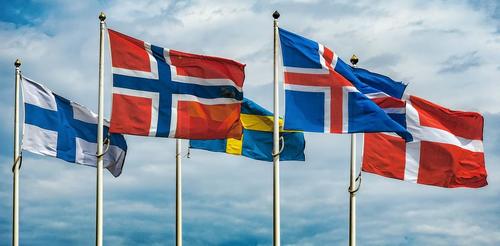No, Nordics Are Not ‘Big Government’, ‘Socialist’, ‘High Corporate Tax’ Nations
A lie is still a lie even if it is often repeated. And claiming the Nordic countries are socialist economies with high taxes for wealth and businesses is a big lie.
Nordic countries are not socialist. They rank at the top in the Heritage Foundation’s Economic Freedom Index 2020 (Denmark,10, Finland, 17, Sweden, 21, Norway, 28). They also rank at the top in the World Bank’s Ease of Doing Business Index 2020 (Denmark, 4, Norway, 9, Sweden, 10, Finland, 20), with simple and limited business regulation and strong support for entrepreneurship.
They also rank at the highest levels in labor market flexibility. Denmark, 7, and Norway, 15, have some of the most flexible labor markets according to the Employment Flexibility Index 2020, while Finland and Sweden rank in the Top 40 above Luxembourg or Korea.
The public sector does not dictate the growth pattern or the way in which the economy should be run, this is generated from the private sector, which finances more than 60% of research and development, and government applies private-sector best practices of efficiency and transparency in the management of public services. In addition, public officials do not have a life-long position. The opposite of the political control that populists defend.
Nordic countries have carried out continued successful privatizations of state-owned sectors, from telecommunications to electricity generation and distribution. Even the postal service in Sweden was placed in a corporate structure and partially privatized.
In these countries, private education is encouraged through school vouchers, not forced state-run schools.
Government bureaucracy is extremely limited and civil servants do not have a lifetime job. In fact, the size of the public sector relative to GDP and compared to total public expenditure is very similar to the global and European average, according to the World Bank Bureaucracy Indicators.
Nordic countries also rank among the highest in Wealth Inequality according to the Credit Suisse Global Wealth Databook 2018, showing that in Sweden, for example, 74.9% of the wealth is owned by the Top 10% and 36.7% to the Top 1%, very similar levels to the United States. In Finland, the Top 1% hold also 36.7% of the total wealth while the Top 10 hold 65.9%
Yes, Nordic countries do have higher taxes and high public spending, but it does not entail bigger government, more bureaucracy or more state control, as interventionists want. Furthermore, the reason why they have higher taxes is not because of elevated wedges for businesses and capital, but due to a very high VAT (value-added tax, a tax on sales).
All Nordic countries’ corporate tax rates are lower than the average European Union and United States’ rates. In 2020, with Denmark and Norway at 22%, Finland at 20%, and Sweden at 21.4%. The U.S. tax rate on corporations is slightly higher at 25.8% (federal and state combined).
Capital gains and dividend taxes are also in line with the rest of the European Union and the United States.
Norway’s top personal tax rate of 38.2% is lower than the United States’ 43.7%. However, Scandinavian countries tend to impose the top personal income tax rates on up and middle-class earners, not just high-income taxpayers.
Nordic “high taxes” come mostly from high VAT & social security taxes, not business or capital taxation, which is lower than in many developed economies.
As the study “Insights into the Tax Systems of Scandinavian Countries” by Elke Asen points:
“If the U.S. were to raise taxes in a way that mirrors Scandinavian countries, taxes—especially on the middle class—would increase through a new VAT and higher social security contributions. Business and capital taxes would not necessarily need to be increased if policymakers were following the Scandinavian model”.
Tyler Durden
Tue, 08/31/2021 – 02:00
via ZeroHedge News https://ift.tt/3DwO80h Tyler Durden
